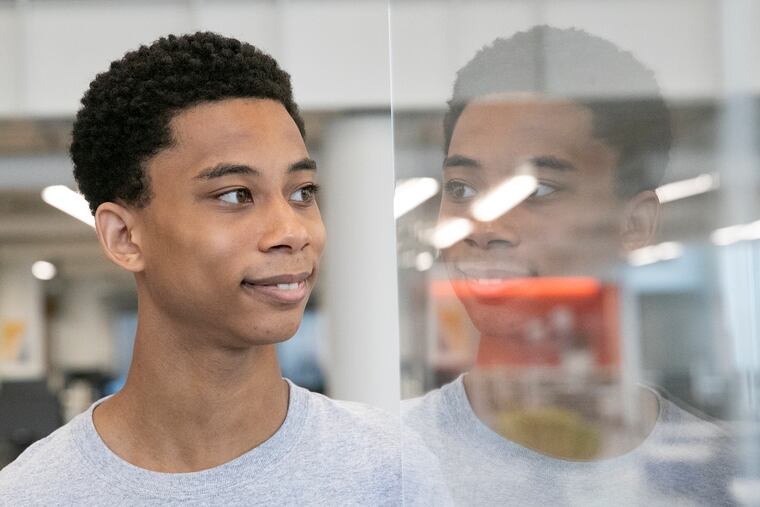In group homes, this Philly student fell behind in school. Then he discovered a program and got himself into Penn.
In a few weeks, Nathaniel Gordon will walk across a stage to receive a high school diploma. He’ll have 36 college credits to his name and a nearly perfect grade point average.

Nathaniel Gordon moved four times during his senior year of high school. At times, he lived in group homes that made it near impossible to study, let alone concentrate on schoolwork.
But in a few weeks, Gordon will walk across a stage to receive a high school diploma. He’ll have 36 college credits to his name and a grade point average above 4.0. A few months later, he’ll enroll in the University of Pennsylvania — the first product of a Philadelphia School District alternative program in recent memory to vault to the Ivy League.
“He’s one of our students that has had the most challenges, but he’s really ambitious, and persevered — more so than anyone else,” said Monifa Young, director of Gateway to College, a Community College of Philadelphia program that offers district students who have not flourished in traditional settings the opportunity to earn college credits while completing their high school diplomas.
Gordon, 18, grew up in rural Georgia.
He was homeschooled and a strong student, but when his family circumstances grew challenging, Gordon moved to Philadelphia at age 13 to live with a relative. The transition was rocky, and the home he expected to live in did not work out as hoped. He found himself in foster care, in online school, behind on credits, with little support.
“I didn’t find it stimulating,” Gordon said of his pre-Gateway school experience. “In some of my placements, they had us altogether in a group, instead of being differentiated into grades. That wasn’t great for me.”
Gordon was stalled, but not stuck — he always had a clear vision of what he wanted. On his own, he searched for different programs he might qualify for and found Gateway to College, a partnership between the district and CCP that enrolls 105 students who have disengaged from traditional schools. Participants get significant support in academics and beyond.
The opportunity felt like a dream come true.
“I wanted to continue my education and get ahead,” he said. “I always had the idea of going to college, but it seemed so far away, especially given where I was.”
It wasn’t easy. Gordon’s intelligence is apparent to anyone who meets him, but shifting to the structure and expectations of college after years of virtual classes and significant personal strife was a challenge. And Gordon started the program in the midst of the pandemic, in November 2020, with classes and meetings completely online.
And while he found classes he loved — one on hip hop and ethics, for instance — others were tougher. Gordon likes math, but it doesn’t come as naturally to him as English classes. He needed help with life things, like sorting out reliable internet, and tuning out the background noise, literal and figurative, of his living situation.
“In the group home, not everybody was ambitious or looking towards the future,” said Gordon. “It was hard to keep good company.”
But school gave Gordon a focal point, and regular check-ins from Gateway staff helped. So did being in classes with people in similar situations, coping with obstacles but fixed on achieving.
“I never felt alone,” said Gordon. “I always had a resource, somebody to talk to about issues that I had, academically or otherwise. And that wasn’t something that I had before.”
He wowed Young right away.
“From the beginning, what set Nate apart is that he always had a clear idea of what he wanted to accomplish with his future,” Young said. “From the beginning, he’s been talking about Ivy League schools. We don’t discourage that, but we tell kids, ‘It’s very hard to get into.’ He stood out.”
Gordon fed his passion for service at Gateway, too, mentoring elementary school students, participating in food drives and community cleanups, raising awareness about elections, and volunteering for a program that provides emotional support to senior citizens with dementia. And he serves as a standout intern for state Sen. Sharif Street (D., Phila.), who working in constituent services and community engagement.
What’s next? Gordon remains in the foster care system, but has moved into a DHS-subsidized apartment, where he lives independently. He plans on a low-key summer indulging his love of the outdoors, seeing Philadelphia on his bike. He’ll continue to work for Street, and maybe join a gym and read, of course.
Penn beckons. Gordon will live on campus and major in economics and urban studies. Law school is a possibility, eventually; he wants to find work that improves people’s lives in some way.
Now that he’s on the cusp of claiming his high school diploma and becoming a full-fledged college student, people are reflecting on Gordon’s accomplishments. He is, too. But mostly, he’s marveling at the support he’s found.
“The recognition means a lot to me,” he said. “It inspires me to continue forward.”